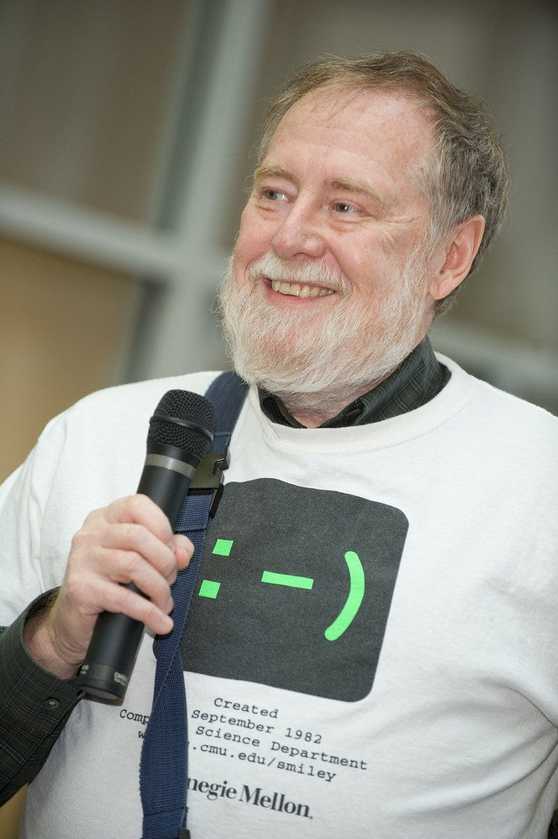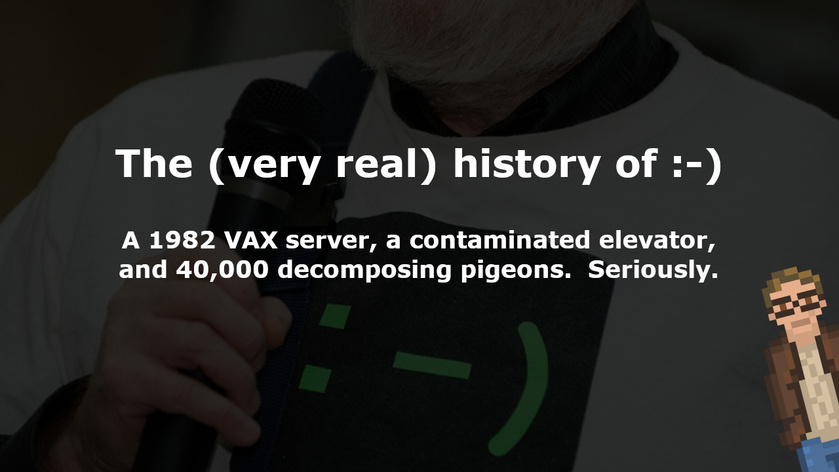On September 19th, 1982 — as Survivor’s “Eye of the Tiger” was blaring on almost every radio station across the land — something revolutionary was happening at Carnegie Mellon University. Something seemingly small… that would go on to change the world as we know it.
This (completely true) story involves 40,000 decomposing pigeons, a bear, a chimical spill scare... the works. I tell ya, this story has it all.
But, first, a little backstory…
On a small VAX server (named “Spice”), there existed a Bulletin Board System. A system where students (and faculty) at Carnegie Mellon could log in, and have conversations on a variety of topics. Presumably related to their areas of study, such as Physics and Computer Science.
But, naturally, instead of posting serious messages and questions… the students often to post jokes. Or joke ideas. Or riddles.
For example, there were a number of pigeon related joke questions posted in September of 1982. Eventually culminating in this post:
16-Sep-82 11:51 James Wright at CMU-780D “Related question”
Of equal interest is how the birds cheeping will sound after they have inhaled the Helium.
How does a pigeon sound after inhaling helium? Seems like a valid question to me.
Regardless. At this point the conversation derails from pigeons…
16-Sep-82 12:09 Neil Swartz at CMU-750R “Pigeon type question”
This question does not involve pigeons, but is similar:
There is a lit candle in an elevator mounted on a bracket attached to the middle of one wall (say, 2" from the wall). A drop of mercury is on the floor. The cable snaps and the elevator falls.
What happens to the candle and the mercury?
Which prompted the following response a few hours later…
16-Sep-82 17:21 Howard Gayle at CMU-780G “WARNING!”
Because of a recent physics experiment, the leftmost elevator has been contaminated with mercury. There is also some slight fire damage.
Decontamination should be complete by 08:00 Friday.
A joke. Obviously. However, many people were upset by the joke. Likening it to yelling “Fire!” in a crowded movie theater.
This prompted one Scott Fahlman — a professor of Computer Science — to post the following:
17-Sep-82 13:04 Scott Fahlman at CMU-10A “Elevators (*)”
Just when you thought it was safe to go back in the elevator...
Unfortunately, the center elevator now contains what seems to be the remains of 40,000 two-pound pigeons in an advanced state of decomposition and the right elevator contains a bear of indeterminate color. The left elevator appears to be safe, but when you stand in it for too long, your voice gets squeaky and you start running into the walls, causing the elevator to rise.
Despite the * in the header of this message, this is not a joke and should be taken quite literallly. Do not panic -- taking the stairs is good for you.
That “*” was, occasionally, used to denote a joke post. A simple warning not to take the contents of any given post to the Bulletin Board too seriously.
What followed was a half-joking discussion about what character should be used in order to denote a post as a joke or not. Because, clearly, the “*” was not the right way to go.
17-Sep-82 14:59 Joseph Ginder at CMU-10A “(*%)”
I believe that the joke character should be % rather than *.
17-Sep-82 15:15 Anthony Stentz at CMU-780G “(*%)”
How about using * for good jokes and % for bad jokes?
We could even use *% for jokes that are so bad, they're funny.
17-Sep-82 17:40 Keith Wright at CMU-10A “*%&#$ Jokes!”
No, no, no! Surely everyone will agree that "&" is the funniest character on the keyboard. It looks funny (like a jolly fat man in convulsions of laughter). It sounds funny (say it loud and fast three times). I just know if I could get my nose into the vacuum of the CRT it would even smell funny!
17-Sep-82 17:42 Leonard Hamey at CMU-10A “{#} (previously *)”
A detailed (i.e. > 1 minute) study of the aesthetic and pictographic effects of the characters available in the ASCII set has led to the following suggestion:
I think that the joke character should be the sequence {#} because it looks like two lips with teeth showing between them.
This is the expected result if someone actually laughs their head off.
An obvious abbreviation of this sequence would be the hash character itself (which can also be read as the sharp character and suggests a quality which may be lacking in those too obtuse to appreciate the joke.)
Then… Lightning Struck.
That’s when it happened. The event that would alter the course of all mankind.
On September 19th, 1982, at 11:44 am… Professor Scott Fahlman posted the following:
19-Sep-82 11:44 Scott E Fahlman “:-)”
I propose that the following character sequence for joke markers:
:-)
Read it sideways. Actually, it is probably more economical to mark
things that are NOT jokes, given current trends. For this, use
:-(
That, right there is the first documented usage of the smiley face and frowny face emoticons on a computer system.
:-)
Note: The Nose
Many people simply use “:)” as a smiley face… with no dash in the middle. This is, technically, incorrect. In order for a smiley face emoticon to be true to the origins of the smiley face, it must contain the middle dash: :-)
This was not the first attempt at a “smile” emoticon
According to another post on the same Carnegie Mellon VAX-based BBS, a different server (there at the same University) had been using \__/ to denote a “smile”.
This was obviously the inferior emoticon. And, rightly, it has been dragged and dropped into the trash can of history.
\__/ ? That’s just the worst “smile” I’ve ever seen. Looks more like a cup. Or a pair of “rabbit ear” TV antenna.
Just the same, we are including a record of it here for historical purposes.
20-Sep-82 17:56 15-1xx Labs at CMU-750Y “jokes \__/”
We on the gandalf vax have our own code word for a joke. The above symbol is universally known as a smile.
Also, perhaps Jeff could include in his scale a "length to humor ratio", as we seem to notice that the relation between some post's lengths are inversely proportional to their length.
There were pre-computer attempts at emoticons…
While many will be quick (and correct) to point out that many authors and publications — dating back many hundreds of years in some cases — have used (or suggested) various types of what we would now call “emoticons”… none of them caught on in any significant way.
Plus… they weren’t on computers. So they don’t count. :-)
Scott has embraced his contribution to the world
This is Scott Fahlman. Wearing a T-Shirt celebrating his creation.

If you haven't already signed up at Lunduke.Locals.com -- at least grabbing a free membership --- it is highly recommended. That way you don't miss out on stuff like this.
Look at that! A handy button to do that thing that we were just talking about! Will wonders never cease!















